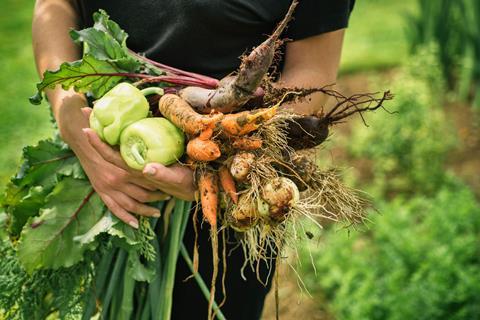Organic food production is rising in Scotland as progress stalls in rest of UK, new Defra stats reveal

Scotland is ”trailblazing” in organic farming while growth has flatlined in the rest of the UK, new government figures show.
Defra statistics for 2023 show England and Wales are failing to meet demand for organic food and drink where sales have doubled in the last 12 years and grown by nearly 5 per cent in the last year.
Yet in Scotland fully organic land has increased by 11.8 per cent from 92,500 hectares to 103,500 hectares.
The Soil Association also understands that Scottish Government has seen a surge in applications for support for organic conversion so far in 2024, indicating that farmers are responding to the support on offer, backed up by ambitious targets.
Meanwhile, just 3 per cent of all farmland in England is farmed under organic standards, and in Wales organic acreage has dropped by 2 per cent to 4.3 per cent.
Soil Association Certification commercial director Alex Cullen said: “Defra’s latest organic land stats reveal that while Scotland is trailblazing in nature-friendly farming, broadly there is a missed opportunity for British farmers.
”We are seeing growth in organic sales but this has largely been fuelled by imports not home-grown produce – with growth flatlining in English and Welsh organic farmland.
“Last year threw so many challenges at our farmers and organic was no exception to that. Nature-friendly food production has not been easy but the tide is starting to turn with both politicians and shoppers investing in this way of farming.
”We now want more farmers to join us and the farmers who are already working hard to scale up organic at pace.”
Cullen said there are increasing opportunities to discover the financial resilience organic can bring to businesses – alongside benefits for the environment, nature, and health.
“We’ve seen a real buzz and interest in regenerative practices in farming. And as the most recognised and trusted form of regenerative farming with robust and legally enforced standards – organic is the natural choice,” she said.
The Soil Association is urging all political parties to use organic to realise their environmental promises as they draw up their election manifestos by encouraging farmers to transition to organic and supporting the sector to accelerate growth.
Parties can follow the lead being set in Scotland and in Europe where Austria and Germany have gone beyond the EU’s targets for organic farmland to grow to 25 per cent and are instead pushing for 30 per cent, Cullen said.
Soil Association senior farm advisor Jerry Alford urged the Welsh government in particular to ”act fast” and introduce support for organic farming within its Sustainable Farming Scheme.
”At a time when farmers reliant on chemical inputs are facing unprecedented costs and diminishing margins, switching to organic is a credible and resilient alternative which often comes with farmgate premiums that more closely reflect the cost of production,” he said.
“With 50 per cent more wildlife on organic farms, we need to turbo charge growth through home grown produce and bring organic farming practices into the mainstream.”
While there are challenges in some organic farming sectors, there are real and immediate opportunities in others, Alford said, citing the example of organic carrot grower RB Organic Ltd.
“We now need to focus on developing some relatively quick wins like cereals, leeks, potatoes, mushrooms, cabbage, kale and apples where the UK is more than capable of meeting the demand for organic,” Alford said.



